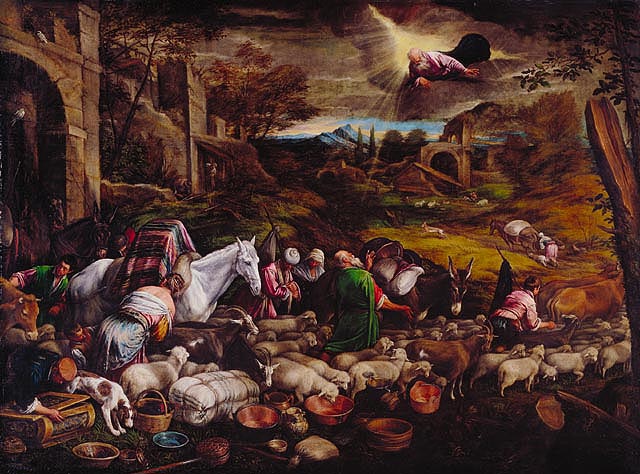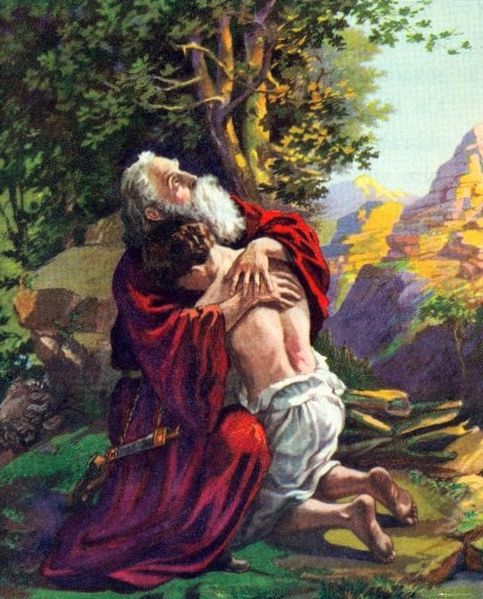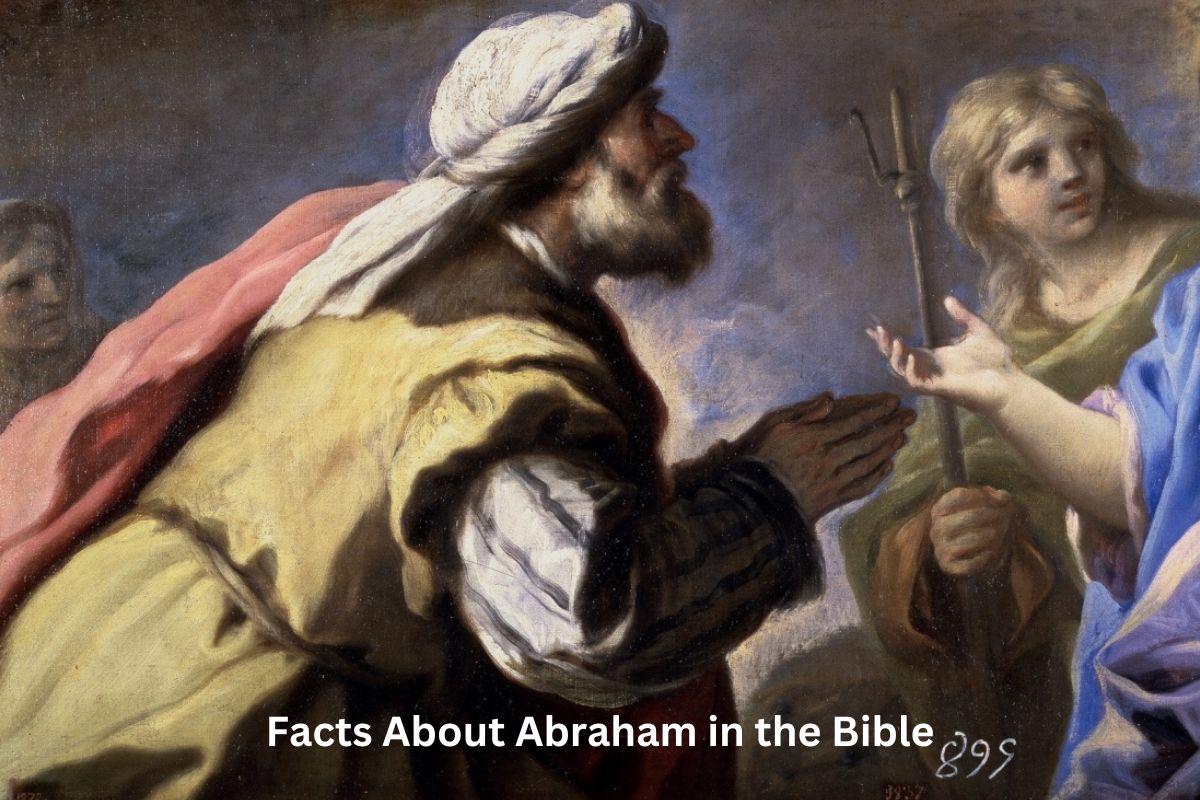Abraham, a central figure in the Bible, is a patriarch whose story spans the early chapters of the Book of Genesis. His life is marked by significant events and divine encounters that have profound theological and historical importance.
Born in Ur of the Chaldeans, Abraham’s journey unfolds as he enters into a covenant with God, experiences a name change that reflects his destiny, and witnesses miraculous events, such as the birth of his son Isaac and the dramatic test of his faith through the sacrifice of Isaac.
His hospitality to angels and his intercession for the cities of Sodom and Gomorrah further illuminate his character.
Abraham’s enduring legacy extends beyond the pages of Scripture, as he is revered in three major monotheistic religions: Judaism, Christianity, and Islam.
His burial place in the Cave of Machpelah remains a sacred site, underscoring the lasting impact of this pivotal figure in the Abrahamic faith traditions.
Abraham Facts
1. Born in Ur of the Chaldeans
Abraham, originally named Abram, was born in the city of Ur, which was located in ancient Mesopotamia. At the time of his birth, Ur was part of the Chaldean empire, which is roughly in modern-day Iraq.
Also Read: Facts About Esther in the Bible
This region was known for its advanced civilization and was home to the Sumerians, one of the world’s earliest civilizations.

2. Made a covenant with God
In the book of Genesis, God made a significant covenant with Abraham. A covenant is a solemn agreement or promise.
God’s covenant with Abraham included several key promises, including the promise that Abraham would be the father of a great nation (Genesis 12:2), that his descendants would inherit the land of Canaan, and that all nations would be blessed through his offspring.
Also Read: Matthew in the Bible
This covenant is considered one of the most foundational in the Bible and plays a central role in the history and theology of Judaism, Christianity, and Islam.
3. Name changed to Abraham
As a sign of the covenant, God changed Abram’s name to Abraham. The name “Abram” means “exalted father,” but “Abraham” means “father of a multitude.”
Also Read: Timeline of Abraham
This name change symbolized God’s promise to make Abraham the father of many nations and to bless him abundantly. Abraham’s wife Sarai’s name was also changed to Sarah as part of this covenant, with the new name meaning “princess.”
4. His wife’s name changed to Sarah
Abraham’s wife, initially named Sarai, played a crucial role in his life. Sarai was known for her beauty, and she accompanied Abraham on his journey. When God made the covenant with Abraham, He also changed Sarai’s name to Sarah, which means “princess.”
This name change signified her importance in God’s plan. Despite her old age and infertility, Sarah miraculously gave birth to their son, Isaac, in fulfillment of God’s promise.
5. Isaac was born to them in their old age
One of the most remarkable events in Abraham’s life was the birth of his son, Isaac. This event occurred when Abraham and Sarah were well advanced in years, and it seemed impossible for them to have children.
However, God intervened, and Sarah became pregnant, giving birth to Isaac. This birth was a testament to God’s faithfulness in fulfilling His covenant promise to Abraham and Sarah. Isaac would go on to become a key figure in the biblical narrative as well.

6. Tested with the sacrifice of Isaac
Perhaps one of the most well-known stories about Abraham is the test of faith involving his son, Isaac. God tested Abraham’s faith by instructing him to take Isaac to Mount Moriah and offer him as a burnt sacrifice. Despite the heart-wrenching nature of this command, Abraham obediently prepared to carry it out.
However, at the last moment, God provided a ram caught in a thicket as a substitute sacrifice, sparing Isaac’s life.
This event demonstrated Abraham’s unwavering faith and trust in God, and it is often interpreted as a foreshadowing of God’s own sacrifice of His Son, Jesus Christ, in Christian theology.
7. Showed hospitality to angels
Abraham and Sarah demonstrated remarkable hospitality to three strangers who arrived at their tent. Unbeknownst to them, these strangers were actually angels sent by God. Abraham and Sarah provided them with food, shelter, and care.
During this visit, the angels delivered the news that Sarah would bear a son, Isaac, despite her old age. This story underscores the importance of hospitality in biblical tradition and the way God often uses unexpected encounters to deliver His messages.
8. Interceded for Sodom and Gomorrah
In another significant event, Abraham interceded with God on behalf of the wicked cities of Sodom and Gomorrah.
When God revealed His intention to destroy these cities due to their sinful behavior, Abraham pleaded with God to spare them if even a few righteous people could be found there.
God agreed, and Abraham negotiated with God, asking Him to spare the cities for the sake of as few as ten righteous people. Unfortunately, not even ten righteous individuals could be found, and Sodom and Gomorrah were ultimately destroyed as a result of their wickedness.

9. Revered in Judaism, Christianity, and Islam
Abraham holds a central and revered position in three major monotheistic religions: Judaism, Christianity, and Islam. In Judaism, he is considered the father of the Jewish people and a key figure in the Abrahamic covenant.
In Christianity, Abraham is celebrated as a model of faith, and his story is often cited in the New Testament to illustrate faith in God.
In Islam, Abraham, known as Ibrahim, is considered one of the prophets and is highly respected for his unwavering monotheistic faith and willingness to submit to God’s will.
10. Buried in the Cave of Machpelah in Hebron
After his death, Abraham was buried in the Cave of Machpelah, which he purchased from Ephron the Hittite. This cave is located in Hebron, a city in the West Bank, and is considered a holy site in Judaism.
It serves as the burial place not only for Abraham but also for Sarah, Isaac, Rebekah, Jacob, and Leah. It is a place of pilgrimage and significance for believers in the Abrahamic faiths, and the cave has been a subject of historical and religious significance for thousands of years.
